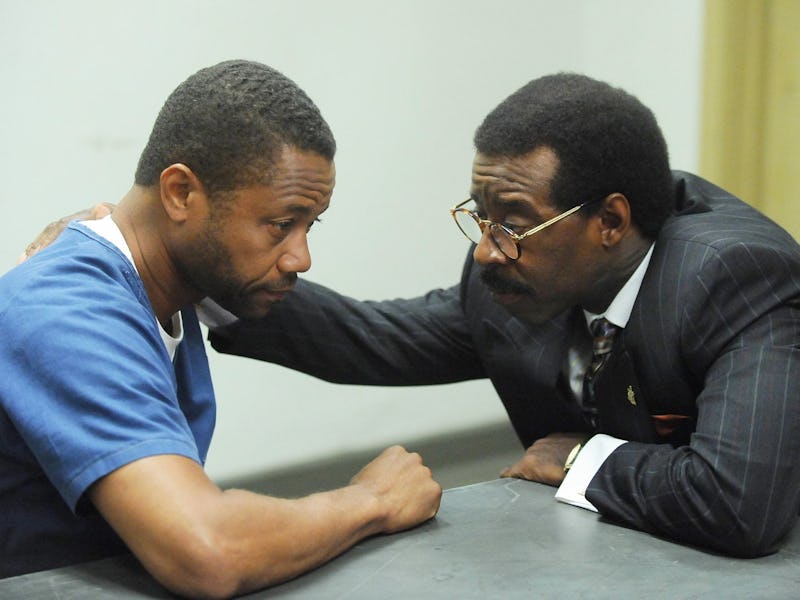Johnnie Cochran the Superhero and 'American Crime Story''s Impotence
In Episode 3, the 'People vs. O.J. Simpson' refuses to build in scope and message.

Greek tragedies — popular back in the good ol’ pre-Christian days with all the amphitheater-going heads in Athens — took inspiration from myths. Sometimes, they poeticized supposedly real events, or mixed them with long-standing legends. Of course, in those very different times, a lot of intel was passed down orally. In this process, the narratives and figures involved sprawled out, transformed, and then ossified — that is, they became “tall tales.” The characters in the tragedies are statuesque, fixed in their connotations and immutable sorrow. Like superheros or John Wick, just the sound of their names could strike strong emotion into the hearts of the public or the play’s supporting characters. They “rang out,” as the phrase goes.
And so it goes with the known commodities in American Crime Story, whether the reaction is by the audience or characters within the story. “Cochran … motherfucker,” Sarah Paulson’s prosecutor Marcia Clark exclaims, as if Tony Stark or Batman is taking the law into their own hands again. Alan Dershowitz’s name has a similarly polarizing connotation. Of course, it’s hard for Schwimmer/Kardashian or an athletically and race-relations concerned segment of the world to credit that O.J. will ever become anything other than “The Juice.”
Focusing on how every character is viewed by the public and those around them — and keeping us, effectively, out of their heads — helps us understand several things. It explains the public reaction to the trial within the world of the show and the show’s melodramatic style and aesthetic. It’s also designed to make us feel tense and invested in the events of the show, as if Gotham is once again at stake. Like Greek tragedy uses symbols as pawns — as vessels for monologues telling emotions rather than showing them — this Ryan Murphy-produced cable show feels like it’s painting a thick coat of drama, as if overcompensating for something. It hand-holds us through the trajectories it wants us to go through, intellectually and emotionally. In other words, you were wrong if you thought that American Crime Story was going to differ significantly from Falchuk and Murphy’s other playful pop-culture-mythology TV smorgasbords. “It’s more of a straight-ahead crime show,” you said. Nope — just look beneath the hood for a minute.
To understand that this is happening, one needs simply to look within. In what way does this show resonate with you? Does it resonate at all? Chances are, you’re more amused or bemused than emotionally or intellectually invested. Part of this is that most of us know the story already. It’s an ode to the phenomenon we remember as onlookers as much as a penetrating, angled view of the trial. But also jokes and ironies subvert cathartic moments, as if being jokes about having cathartic moments (Damnit, Murphy! shakes fist). Think of Marcia in her backyard, or the moment when the possibility of the race defense dawns on Travolta/Shapiro. “Imagine that O.J. Simpson was set up by the cops, because he’s a black man,” Travolta says in a fractured cadence. It’s such extreme self-parody that it transcends Travolta as we know him, resembling the precocious tones of an adenoidal role-player announcing a big Dungeons & Dragons play. Like every “eureka” moment on ACS, it’s self-sabotaging, and perhaps by design.
And so Scott Alexander and Larry Karaszewski’s show begins to lose its edge already. Its Mamet/Mann-ish tone has all of the dynamism of flat soda. When O.J. announces, “I’m not black. I’m O.J,” one draws something of a mental blank, rather than feeling the sociological and political resonances. American Crime Story: The People v. O.J. Simpson begins with a montage of footage from the Rodney King riots, and seeks to make us remember that at every turn. But characters talk about the conflict of racial identity in O.J. the public figure like they are reading from the comments sections on modern-day think pieces about the trial. As in Greek tragedy, American Crime Story dramatizes the myth of O.J., even though its advertising indicates that it will reveal it to us in a new way. It chuckles at itself in between plot points, as if to smirk at how big the phenomenon of this case got in the mid-’90s — when people carried around “beepers,” ha!
The question of whether Alexander and Karaszewski’s show makes you think deeply about the way in which the world conceives of and talks about criminals, or embraces media sensationalism, is not yet settled. It’s up to you: How much time are you willing to give American Crime Story until it tells you something you didn’t know, or digs its talons into you in any way that you don’t forget after turning the TV off? Murphy and the gang aren’t holding your hand through their carefully crafted self-aware landscape; they’re clutching the circulation out of it.
Now, for some Shapiro/Robert Kardashian theme music: